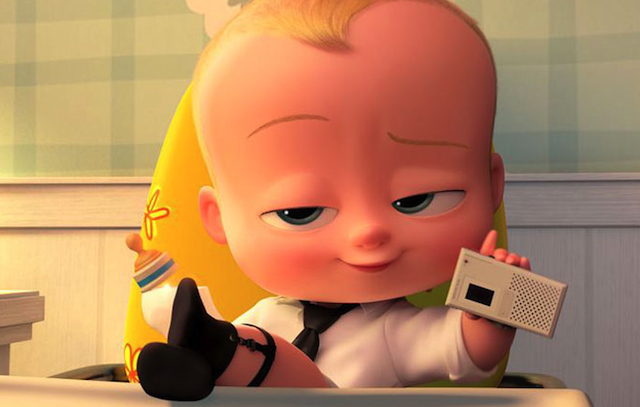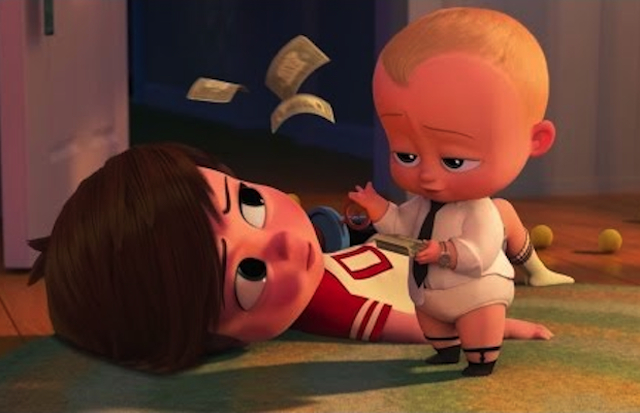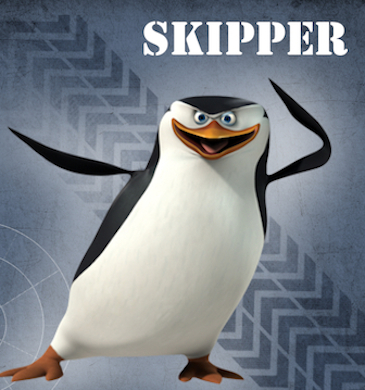CHICAGO – In anticipation of the scariest week of the year, HollywoodChicago.com launches its 2024 Movie Gifts series, which will suggest DVDs and collections for holiday giving.
Interview: Director Tom McGrath is Boss of ‘The Boss Baby’
CHICAGO – In one of the most natural pieces of voice casting in cartoon history, Alec Baldwin portrays the title character in Dreamworks Animation’s “The Boss Baby.” The director is animation veteran Tom McGrath (“Madagascar”), and the producer is Ramsey Ann Naito, and they were both in Chicago to promote the film.
“The Boss Baby” is fast, loose, funny and full of heart. Based on a children’s book by Marla Frazee, the animated version combines baby brother jealousy with Mad Men-era business self help, in a crazy visual landscape. Alec Baldwin is at his “30 Rock” best as the Boss Baby, delivering lines like the parody of his famous movie quote, “cookies are for closers.” There are many layers in the film, but mostly it is a hilarious metaphor on how families adjust when new siblings are added to the mix.

Alec Baldwin is the Voice of ‘The Boss Baby,’ Directed by Tom McGrath
Photo credit: 20th Century Fox
Director Tom McGrath is a animation master, and began his career in part under the tutelage of John Kricfalusi on “The Ren & Stimpy Show.” He morphed naturally into the new Golden Age of Animation with gigs on Ralph Bakshi’s “Cool World” and the Warner Bros. “Space Jam,” plus took the director’s helm on the “Madagascar” series and “Megamind.” He also lends his voice to some characters, including the classic Skipper the Penguin from the Madagascar universe (“Rico!”). Producer Ramsey Ann Naito has worked as animated film production manager on “South Park: Bigger, Longer & Uncut,” “Rugrats in Paris” and “Jimmy Neutron: Boy Genius.” “The Boss Baby” is her first film as full producer.
HollywoodChicago.com indulged these two animation vets in a lively conversation regarding the creation of “The Boss Baby,” and how in this case an actor’s voice interpretation actually changed the look of a character in the movie.
HollywoodChicago.com: How much of an aesthetic did you derive from the storybook in creating the world of the ‘The Boss Baby’?
Tom McGrath: Well, Marla Frazee’s artwork was really charming, and we adapted it in a way, but really what we were trying to celebrate was the animation of the 1940s, ‘50s and ‘60s. The computer animation is getting more towards realism, and we wanted to harken back to [film animators] Chuck Jones, Maurice Noble and Mary Blair, all the artists with a great design sensibility. We wanted almost to feel the brushstrokes in ‘The Boss Baby.’ It was actually a little more difficult to do because today’s animation is so slick and realistic, so we spent a lot of time watching the animation of our youth. It is a kid’s imagination, so we wanted a more stylized approach, and a lot of us got into animation as a career because we grew up with those cartoons.
HollywoodChicago.com: The voice cast is unconventional, and not what we usually hear in animation. What was your philosophy in casting, and what do you think the unconventionality brings to the film?
McGrath: To me, it’s important to find unique voices. Alec Baldwin was always the first choice as the Boss Baby… years before we actually asked him to do it. We took a baby from ‘Megamind’ and animated it with Alec Baldwin lines from ’30 Rock.’Alec saw those clips and fell in love with the concept of the movie. Alec was also a big fan of Mel Blanc [voice of Bugs Bunny and others]. Lisa Kudlow and Jimmy Kimmel came into consideration by listening to their talk show banter. Jimmy was the first to admit he isn’t an actor, but we just had to point out that he is a father, so he channeled that fatherhood and made his Dad a genuine character.
HollywoodChicago.com: What inspired the casting of Steve Buscemi?
McGrath: I just thought he was great, he actually redefined the look of his character [Francis Francis, CEO of PuppyCo]. We first did this sappy businessman look who had arrested development. As soon as Steve started recording him, we went back the character and redesigned him, to suit more what he was doing.
Ramsey Ann Naito: We also cast Miles Bakshi as the voice of big brother Tim, who is the grandson of the legendary animator Ralph Baskhi, and Tom had known Ralph for a long time. Miles came in to do some test ‘scratch vocals’ for Tim, and we fell in love with him. The quality of his work was authentic and real, with a charm and playfulness to his line readings.

The Title Character is Dying for a Spicy Tuna Roll in ‘The Boss Baby’
Photo credit: 20th Century Fox
McGrath: The joke with Ralph is that he gave me my first job in animation, and I got to give his grandson his first job in animation.
HollywoodChicago.com: Much of the film makes fun of the conventions of American business. How much of that is an expansion of the storybook, and what sources was the screenwriter going to in developing that aspect of the Boss Baby character?
McGrath: The book is a simple and elegant metaphor…to paraphrase, it’s a baby in a suit. When [screenplay adapter] Michael McCullers and I started to develop the story, the theme was the fear of a older sibling not having ‘enough to go around’ when a younger brother comes into the family. That expansion was based on the older brother’s fear, and we thought it would be great that in his imagination there would be these rival companies, PuppyCo versus The Boss Baby. Those two businesses are competing for and quantifying love, and the lesson in the film is that if you give your love away, it comes back to you tenfold.
The other feeling was inspired by ‘How to Succeed in Business Without Really Trying,’ that kind of 1960s business flair. We rationalized it because during the Baby Boom that was the Boss Baby’s most successful period. We went back to that era to research the look and feel of it, and contrasted it with PuppyCo, which we designed like Hickory Farms on steroids. [laughs]
HollywoodChicago.com: Alec Baldwin was so much like the Boss Baby that it’s hard to imagine anyone else in the role. How does his unique timing serve the character the best, and what surprised you most about his approach to the character?
McGrath: In this case, he always exceeded expectations. When I first worked with Alec in ‘Madagascar 2,’ he took a small role that wasn’t really written funny, and made it funny. For the role of Boss Baby, he actually was having babies during the course of the recording the voice, and channeled them. He helped define the Boss Baby with his flat and dry delivery, with a bit of baby added in – his unique modulation was able to achieve that mix.
We would be in the recording studio with a line that we thought was a straight line, and he would twist it and use timing to make it hilarious. We often blew some takes with laughter, so sometimes we had to bite our knuckles to get through it. He’s a master impersonator, and he did one of the Elvis voices as well. Of all the people I’ve worked with, he just had one of the broadest ranges.
Naito: And over the course of three years, we had about 40 recording sessions, and he was always so generous and inspired by the material. We were thankful that he worked on the film, and gave so much to it. It was simply a great experience with him.
HollywoodChicago.com: The animated genre of movies is so prolific in the movie marketplace of today. Were there any elements of the current animation that you wanted to avoid – for example, pop culture references – in the creation of ‘The Boss Baby’?
 Rico! Tom McGrath was the Voice of Skipper in ‘Madgascar’ Photo credit: 20th Century Fox Home Entertainment |
McGrath: Yeah, you can get trapped in the pop culture references, and we do have a few, like the ‘Raiders of the Lost Ark’ joke. It had to come from the amalgamation of what we were borrowing from… the 1960s, ‘70s and ‘80s. Sometimes we had a great joke but it was too contemporary, and we didn’t want to pull out from the era we were representing.
HollywoodChicago.com: Ramsey, which of the many animated features you worked on was your boot camp for the eventual producer title you have for this film?
Naito: It was definitely ‘South Park: Bigger, Longer & Uncut.’ [laughs] I was the production manager on that film, and the creatives Trey Parker and Matt Stone wanted to put the best film that they could on screen. Besides the production angle, it was also a boot camp for how much you can get done in a short period of time, and how much you have to fight to do it… but it was all about getting the best film possible.
HollywoodChicago.com: Tom, you directed a couple of episodes of the legendary ‘The Ren & Stimpy Show’… what can you say about the magnificent animator John Kricfalusi that the rest of the world doesn’t know?
McGrath: What John did was reinvent cartooning, when no one was doing it creatively anymore. Because he was so diligent about the drawings and the animation style, he made people realize again how much fun cartoons can be. He brought that fun back from the dead, and what John did was not very feasible in a typical TV animation budget. He also brought back the humor that made animation so unique and great, and in that way brought back the art as well.
‘The Ren and Stimpy Show’ was a challenging series to work on, it was almost like a drawing school, with a bar that was set very high. There are shows that try to emulate it, but I don’t think there is anything that comes close to what John created.
 | By PATRICK McDONALD |


